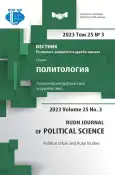The Institutionalization of Urban Communities of Major Regional Centers of the Russian Federation in the System of Political Conflict Management: Limits of Possibilities
- Authors: Kolba A.I.1, Orfanidi E.V.1
-
Affiliations:
- Kuban State University
- Issue: Vol 25, No 3 (2023): Political Urban and Rural Studies
- Pages: 601-613
- Section: PUBLIC POLICY IN URBAN SOCIAL LANDSCAPES
- URL: https://journal-vniispk.ru/2313-1438/article/view/322216
- DOI: https://doi.org/10.22363/2313-1438-2023-25-3-601-613
- EDN: https://elibrary.ru/SCXCXS
- ID: 322216
Cite item
Full Text
Abstract
In modern Russia, the problems of institutionalized participation of the communities of major regional centers in political conflict management and decision-making on the urban development agenda are becoming more relevant. Political institutionalization is considered by the authors in the context of the liberal theory of conflict, the neo-institutional approach, and illiberal peacebuilding. The authors draw conclusions on the growth of the subjectivity of urban communities with their lack of involvement in the system of political governance at the city level, based on the data of an empirical study conducted through semi-structured interviews with leaders and activists of urban communities in three major regional centers of Russia - Voronezh, Krasnodar, Yaroslavl, as well as an expert survey in these cities. The analysis of the “Krasnodar Tram” case reveals such problems as the low level of institutional trust in the system of interactions between urban communities and local authorities, as well as the lack of effective mechanisms for coordinating decisions in a conflict. Thus, the political institutionalization of communities is limited in scale, which is due to the state of the public policy space at the municipal level, the hybrid nature of institutional regulation, as well as the structure and characteristics of the activities of the communities themselves.
About the authors
Alexey I. Kolba
Kuban State University
Author for correspondence.
Email: alivka2000@mail.ru
ORCID iD: 0000-0002-7663-8890
Doctor of Political Sciences, Associate Professor, Professor of the Department of Public Policy and Public Administration
Krasnodar, Russian FederationElvira V. Orfanidi
Kuban State University
Email: elviravictorovna@gmail.com
ORCID iD: 0000-0001-5833-882X
Applicant of the Department Public Policy and Public Administration
Krasnodar, Russian FederationReferences
- Aleinikov, A.V., & Pinkevich, A.G. (2015). Conflict under hybrid political regimes: The case of Russia. Vestnik of Saint-Petersburg University. Philosophy and Conflict Studies, 31(3), 85–95. (In Russian).
- Bederson, V. (2022). An influential light of Moscow windows: Communication and organizational factors of civil and political activity in Moscow districts. The Journal of Sociology and Social Anthropology, 25(2), 158–175. (In Russian). https://doi.org/10.31119/jssa.2022.25.2.7
- Coser, L. (2000). Functions of social conflict. Moscow: Idea-Press. (In Russian).
- Dahrendorf, R. (1991). Liberalism. The New Palgrave Dictionary of Economics. London: Macmillan, 385–389.
- Dayneko, A.I., & Dayneko, D.V. (2017). Institutional problems in urban planning and modern methods of reconstruction for Siberian cities. IOP Conf. Series: Materials Science and Engineering, 262, 1–5. https://doi.org/10.1088/1757-899X/262/1/012065
- Glukhova, A.V. (2011). Conflicts in ordinary and extraordinary politics. Extraordinary, Chance and Protest in Politics: Thematic and Methodological Field of Comparative Research. Krasnodar: KubSU, 130–140. (In Russian).
- Golbraih, V. (2020). Social networks as a resource for the institutionalization of social movement (on the example of the conflict around garbage conflicts in the Arkhangelsk region). Power and Elites, 7(1), 183–203. (In Russian). https://doi.org/10.31119/pe.2020.7.1.7
- Jayasuriya, K., & Rodan, G. (2007). Beyond hybrid regimes: More participation, less contestation in Southeast Asia. Democratization, 14(5), 773–794. https://doi.org/10.1080/13510340701635647
- Kosygina, K.E. (2020). Civic participation barriers within non-profit organizations: Regional measurement. Issues of territorial development, 8(2), 1–18. (In Russian). https://doi.org/10.15838/tdi.2020.2.52.5
- Kriesberg, L. (1998). The phases of destructive conflicts. Communal conflicts and pro-active solutions. The International Politics of Ethnic Conflict. Prevention and Peace-keeping. Columbia: University of South Carolina Press, 33–60.
- Levitsky, S. (1998). Institutionalization and peronism: The concept, the case and the case unpacking the concept. Party Politics, 4, 77–117. https://doi.org/10.1177/1354068898004001004
- Malyutina, O.V. (2009). Institutionalization of local communities as a condition for the development of social activity of residents of a large city. Penza. (In Russian).
- Pruijt, Н. (2003). Is the institutionalization of urban movements inevitable? A comparison of the opportunities for sustained squatting in New York City and Amsterdam. International Journal of Urban and Regional Research, 27(1), 133–157. http://dx.doi.org/10.1111/1468-2427.00436
- Ramsbotham, O., Miall, H., & Woodhouse, T. (2011). Contemporary Conflict Resolution. Cambridge: Polity.
- Scalaban, I.A., Sergeeva, Z.N., & Lobanov, Yu.S. (2022). The defendants. The defensive functions of communities in urban conflict (based on a case study in Novosibirsk). Mir Rossii, 31(4),
- –56. (In Russian). https://doi.org/10.17323/1811-038X-2022-31-4-33-56
- Scott, W.R. (2008). Institutions and organizations: Ideas and interests. Thousand Oaks: Sage.
- Shepsle, A.K., & Bonchek, M. (1997). Analyzing politics. New York: Norton.
- Smith, C.Q., Waldorf, L., Venugopal, R., & McCarthy, G. (2020). Illiberal peace-building in Asia: A comparative overview. Conflict Security & Development, 20(1), 1–14. http://doi.org/10.1080/14678802.2019.1705066
- Smoleva, E.O. (2021). Forming the practices of citizens’ participation in the development of the urban environment: Habitualization or institutionalization from above. Economic and Social Changes: Facts, Trends, Forecast, 14(5), 244–260. (In Russian). https://doi.org/10.15838/esc.2021.5.77.14
- Zhelnina, A.A., & Tykanova, E.V. ‘Players’ in ‘arenas’: A study of interactions in local urban conflicts (a case study of Saint Petersburg and Moscow). The Journal of Social Policy Studies, 19(2), 205–222. (In Russian). https://doi.org/10.17323/727-0634-2021-19-2-205-222
Supplementary files









